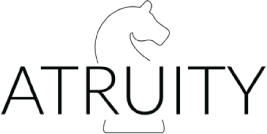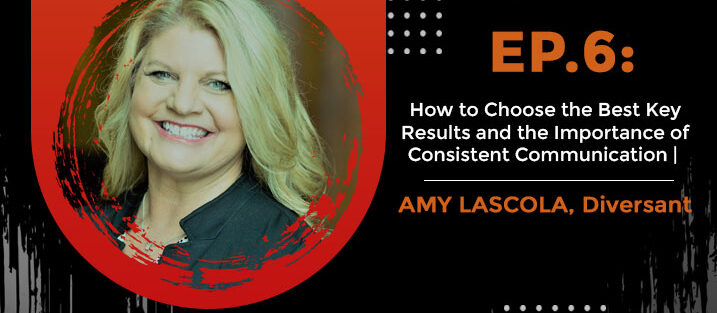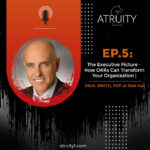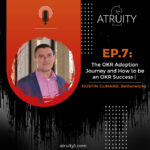In this episode of the OKRs Q&A Podcast, Tim Meinhardt interviews Amy LaScola about her experience using OKRs in the IT Staffing industry. Amy is currently the Vice President of Enterprise Delivery for Diversant – an IT Staffing company located in New Jersey. She is a Talent Acquisition professional with over 25 years of experience in recruiting, operations, account management, training, talent resourcing, and operational roles – in RPO, Contract, and MSP environments.
Tim Meinhardt:
Welcome everyone to another exciting episode of the OKR Q and A podcast, also known as the OKR Corral. Where OKR insight is the [inaudible 00:00:19]. I’m your host, Tim Meinhardt, CEO of Atruity and OKR consultancy headquartered in our nation’s capital.
Tim Meinhardt:
Today, we are thrilled to be able to talk with Amy LaScola. Amy is a true talent acquisition professional having over 25 plus years in recruiting, operations, account management, training and talent resourcing. Her leadership philosophy is focused on innovation, data-driven strategies and solutions, coupled with a constant focus on the importance of inclusion in an ongoing commitment to helping individuals meet and exceed their professional and personal goals.
Tim Meinhardt:
Currently she’s the vice president of Enterprise Delivery for Diversent, where she has developed a strategic client-focused consultative approach to finding the best solutions for their large enterprise client base. She’s energetic, she’s invigorating and you’re going to truly enjoy hearing what Amy has to say about OKRs. So please, let’s welcome Amy LaScola. Welcome to Q and A podcast. Amy, tell us a little bit about yourself.
Amy LaScola:
Sure. So Amy LaScola. I am the VP of enterprise delivery here at Diversent. I’ve been here about 18 months and been in staffing, I don’t even want to tell you, about 28 years, so a long time.
Tim Meinhardt:
Terrific. Tell the audience a little bit about, and we’ve been working with your group now about eight months, and so what were your initial impressions about objectives and key results?
Amy LaScola:
So let me be frank, Tim. It probably wasn’t a positive. And it’s basically because you get these initiatives that corporate pushes down maybe on you, and you go, “Really it’s something else we have to do.” And that’s never a good mindset or approach, but when you’re busy and you have a lot going on, that’s the first thought.
Amy LaScola:
And I have to say, I think I’m very good at to do lists and KPIs and key performance indicators and tracking performance. So those are the things that my career has been built on. And so when I thought OKR, I probably thought more of a goal setting, less of a goal setting, more of a KPI type of thing. And once you get into it, you realize it’s actually way more than what I had originally anticipated.
Tim Meinhardt:
Right. KPIs are kind of the result after the fact where, OKRs, and you and I have talked about this, are kind of from, “What are we doing now to try to achieve those objectives.”
Amy LaScola:
Right. KPI is backward and OKRs is forward. And that’s the one thing that I think I was good at the backward and wasn’t as good at the forward. And that’s what OKR has really taught me.
Tim Meinhardt:
Yeah. No, for sure. What do you think was the biggest challenge for you actually getting started with the OKRs?
Amy LaScola:
I’m a multitasker, as you probably know. I like to do 18 things at once. And so I think it was coming up with what are the three, four, five, and I think you were a great coach for that, Tim. Just take it down a notch. Don’t try to boil the ocean the first time. This is your first OKR process. So find the three to five things that you can do and do well. And again, you helped guide that behavior for me. Because I do think I kind of go, “I want to solve everything. I want to do it all.” And you said, “No, come on now. Let’s come up with something that’s a little bit more refined and have that radical focus on the things that you’d want to succeed on.”
Tim Meinhardt:
Sometimes we see that folks want to have 10 different objectives when you start distilling it down, it’s what are the most important things that you need to be accomplishing during a given period of time based on what it is that you’d like to accomplish.
Tim Meinhardt:
How about the biggest success story so far to date? We’ve been doing this, like I said, about eight months and your team really had a great quarter.
Amy LaScola:
We did.
Tim Meinhardt:
And so share with us what you think your biggest success story has been with OKR so far.
Amy LaScola:
Well, it’s probably the ones that we set, I actually just pulled them up for Q2. I looked at it and went, “Wow, this seems like a huge undertaking.” And as the quarter ended, I looked back and I said, “We did it. We met most of them. And we did it very well.”
Amy LaScola:
So I think it was knowing the objectives and making them measurable. And then going back and looking and saying, “We moved performance. We moved performance I think almost 20% from where we started forward.” So that was just huge. We set the goal. I kind of said, “I probably won’t meet this.” It was a little bit of a stretch. And then we met it. And I think it was so exciting to see, set the performance goal, three months in you did it. And it came down to the last day that we actually met the goal. And so I was super excited.
Amy LaScola:
Of course, Q3, we’ve stretched a little bit more, because that’s what you do. We may not meet it for Q3, but that’s okay because we set something and we met and we achieved it and I think it was sticking to it. Knowing that it’s something that we wanted to win and just continuing to focus on it. Again, I keep going back to that radical focus. It was something that we said we wanted to surpass it and we did. And to me, I want to do a backflip at the end of the quarter because we made it.
Tim Meinhardt:
Yeah, and I remember the conversation was, “Tim, these are stretches.” And I said, “That’s okay, come on we’ll give it a shot.” And your team really, really has done a great job as well. Maybe want to speak a minute or so about your team and how they felt during this process as well.
Amy LaScola:
Sure. Because I think that’s one of the tips I would give for an organization that wants to do this is you set the goals and then your leadership team supporting you they need to be kind of in that same goal setting arena. They need to be setting the same goals and they need to be consistent. So you don’t want one team member saying, “I want to meet 80%,” one team member saying, “I want to meet 70%.” No, everybody needs to be on a consistent platform.
Amy LaScola:
And then I push down, “This is where we want to be.” And then we communicate down another level. And so I have six directors that reported to me and then 60 recruiters underneath them. And it was really about us communicating our goals and objectives all the way down the hierarchy and making sure that when we met them, we celebrated with them. We all had the same goal to meet a certain performance goal and we met it for the quarter. And I think as a director team and a recruiter team, we now can celebrate collectively.
Tim Meinhardt:
Yes. I think celebration is a big deal. You’re asking people for a 13 week sprint and let’s really buckle down here and see what we can get done. And then celebrate a little bit for successes. When you’ve stretched past what you think you can do and you accomplish it, everybody feels fantastic. Okay. And that ability to celebrate a little bit, even though we’re celebrating remotely [crosstalk 00:07:11].
Tim Meinhardt:
So how about advice? Some organization is looking into objectives and key results, and what advice would you give them if they’re even remotely considering something like this?
Amy LaScola:
I would say your advice to me, I think, because again, I’m that, “I’m going to do 18 things at once. I can do it all, Tim.” Keep it simple. Focus on the objectives that you know you can achieve within that given timeframe, because it’s a three month and you don’t realize how fast a quarter goes until you’re mid quarter or even like we’re now, I can’t believe we’re a month out of our third quarter. How did that happen?
Amy LaScola:
And I think I was so hyperfocused on OKRs Q2, I did better. I’ve got an issue for Q3 because I don’t know that I’ve had the same attention. It’s not new. So I’ve got to go back and go, “It worked in Q2, Amy focus back. Get in there, be specific on what you want to accomplish.” And then the cascading piece I think is the hugest thing, Tim, is that you connect the dots for everyone in the organization.
Amy LaScola:
Like, “I want to do this. And together we’re going to do it.” Because I can have a goal. But if I don’t cascade it down to the individuals that are going to help me accomplish that goal, I’m not getting anywhere.
Amy LaScola:
And then making it measurable. I think the hardest thing in our business specifically is we say we want to do better, at what? Is there a baseline? What’s better than what we are doing now? Do we even know what the baseline is? So making it measurable by having that baseline I think is huge.
Amy LaScola:
And don’t worry about if it is a stretch, I kind of freaked out Q2, “I don’t think I’m going to make that Tim.” And I’m already saying that in Q3, “I might not make it.” Well, I might not make this one, but that’s okay because that’s what this is about. It’s taking those goals, trying to get there, and when you don’t get there, it’s not like you’re going to go hide in a corner. It’s that you maybe set something that was too much of a stretch and we’re going to do it again next quarter. So I think to celebrating the wins, recognizing that nothing that we’re doing is easy, and then when it does work, you’re just super happy.
Tim Meinhardt:
Yeah. You mentioned something here and I’d like to touch upon it and get your thoughts on it real quick. Collaboration is a big deal. And buy in is a big deal as well.
Amy LaScola:
Huge.
Tim Meinhardt:
And your team did a wonderful job at this and I just wonder how it all came together and how they turned to the buy-in aspect of OKRs?
Amy LaScola:
I think it’s like most things where we stumble in any organization, any organization I’ve been in, is communication. And so even before, you met with me, then you met with each of my team members and then we meet as a group. So it’s a simple cadence. But before you met with each team member, I met with them and I went through, “This is what I’m setting for my objectives for the quarter. Let me help you with yours.”
Amy LaScola:
It can be overwhelming if you’ve not done this before, especially the first time. And so we just spent a lot of time on just talking about what an OKR could be. What’s measurable? What do you think we can do as an organization together collectively to be better? And so I think again, that key is that collaboration and is that communication to make sure you’re all on the same page because we’re either going to celebrate together or we’re going to lose together. And that’s the definition of team, right?
Tim Meinhardt:
Absolutely. Okay. One final question. Well, actually I have two, but I’ll say one final question, what was the one burning question that you had about OKRs? And what was the answer that you found?
Amy LaScola:
I think it goes probably back to my cynical beginning, which was, “Do I really need this?” That was the one. And, “Who is this guy, Tim, coming in? Do I really need his help? Once he shows me, can he just go?” Which is a horrible thought process, but for me your coaching and me being open to trying it is for me, again, I’m not brand new in this career, I’ve been doing it a long time. And so the staffing business, when you look at it and you go, “What can you do differently?” I’ve done it all. So I kind of have that cynical, “Done that Tim. Don’t need to do that. I set objectives. I set KPIs.”
Amy LaScola:
This is different. It truly is. This is measurable. It’s a 13 month sprint like you say, and you’re either super excited at the end or you’re questioning, “Should I have done that different?” And I think it’s the time period and setting those goals and having those measurable objectives.
Amy LaScola:
The burning question probably was, “Will this work?” And the burning answer is, “It did.”
Tim Meinhardt:
That’s terrific. Well, so the last question is there any other thing you’d like to pass along to our audience that maybe I haven’t asked that has to do with objectives and key results? You’re running a division and anything any insight that you might provide.
Amy LaScola:
Again, be open. I feel like I’ve been saying it over and over, and maybe the materials that we read in advance were good. And so with anything, preparation is key and knowing what you’re getting into. But then again, checking yourself every so often, for me, the craziest thing, Tim, is I go into the PowerPoint, the OKR presentation, and I make myself look at it once a week to make sure that I’m sticking to it. And that sounds simple. But again, you get lost in your day to day work and doing your thing. And we really want this to be action oriented and that we’re doing something with it. And so the key for me has been just staying on it. And then I think getting on the phone with your peers every two weeks and going over where you are, it’s peer pressure. Let’s be honest. You don’t want to get on there and say, and we have people that do this, right, Tim, they get on there and say, “I didn’t do anything with this.”
Amy LaScola:
I’m not going to be that person. So I will make sure that I’m on that PowerPoint, I’m making sure that it’s updated, that I am paying attention to this because I see the value of the importance of it. So I don’t know if that was your question or not, but again, I’m a huge advocate and a huge fan of this.
Tim Meinhardt:
Terrific. Well, Amy, thank you so much for being on the program today and I wish you continued great success in Q3, and we will speak shortly during our next readout.
Amy LaScola:
Sounds good. I appreciate it. Look forward to it.
Tim Meinhardt:
Thanks Amy. You too. Bye now.
Atruity has proven-effective OKR implementation methodologies that yield fantastic results in your organization. Our team can create personalized advice on OKR. We have the right strategic planning tools essential for choosing the right objectives and key results. Give our office today at 240.403.4086.
To listen to the podcast, click on the links below:












